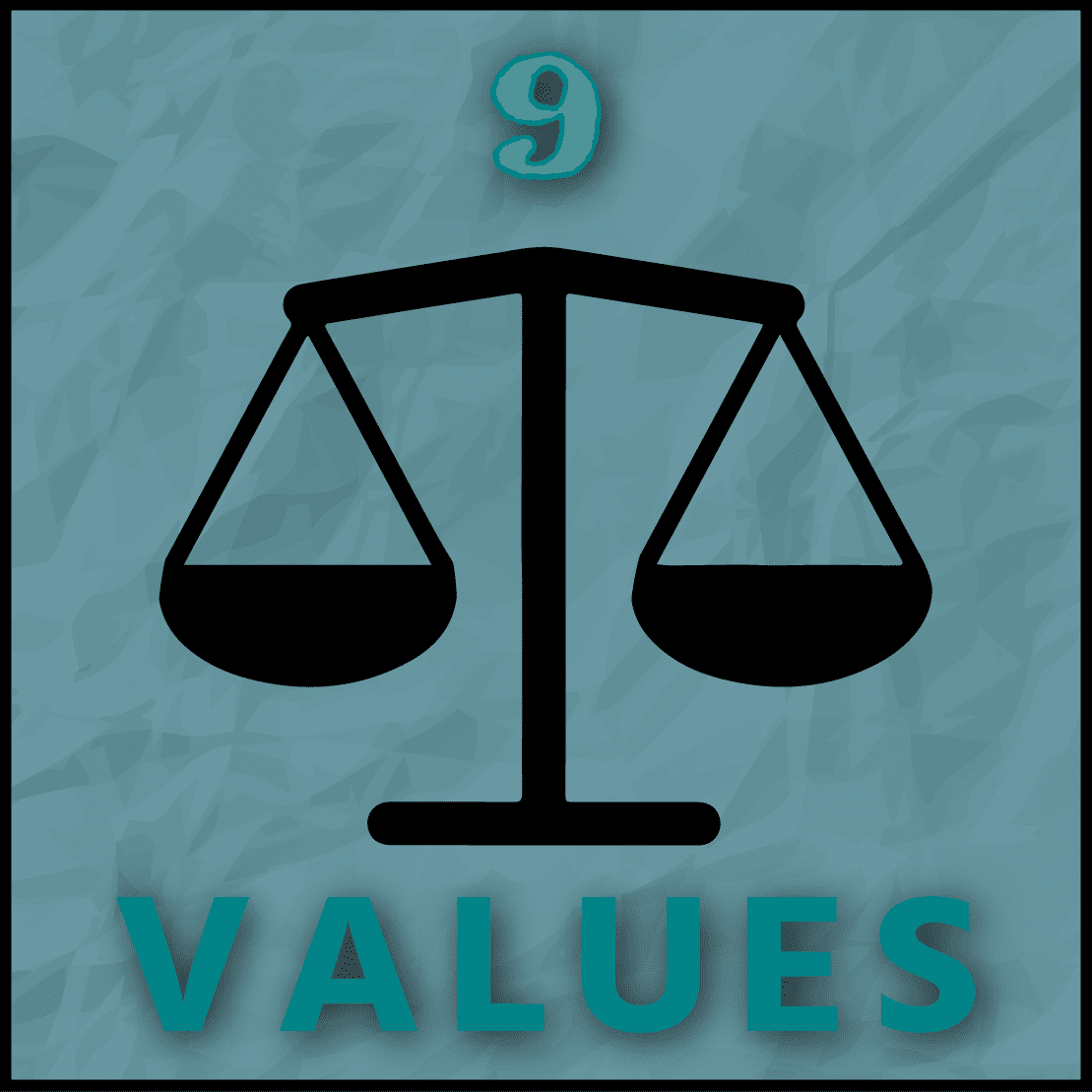
Values are the guiding principles by which we live or, at least, they are aspirations that help us align our actions with our principles. Without values, we would be living in an immoral or amoral world of interpersonal confusion and existential chaos. At the same time, too strong an adherence to our values can create a counter-effect of personal and interpersonal difficulties. And too strong an identification with these values keeps our type structures in place, thus inhibiting our growth potential.
Enneagram 9s emphasize three important values: consensus, harmony, and respect. They often think or say the following: “We are in this together.” “The absence of tension and conflict allows everyone to get along in a peaceful way.” “Rudeness is no OK; everyone needs to be treated with respect.” Enneagram 9s appear relaxed, easy-going and non-judgmental, experience themselves as not-driven by ego , and are generally humble, sometimes to the extent of being self-effacing.
These three values – consensus, harmony, and respect – support the Enneagram 9 “ego ideal” of being the “peaceful person,” a person who is kind, unpretentious, accepting, tolerant and content with what is. The “ego ideal,” according to Enneagram author and teacher Jerry Wagner, is the idealized self that people use as a positive definition of self, a partial answer to the question “Who am I?”
The issue is that while our type-based values are positive ones, we can hold onto these values so tightly and narrowly – after all, our idealized self depends on our firm belief in these principles – that these values can become impediments to our growth.
Consensus
What makes consensus so important for Enneagram 9s? Isn’t consensus important in a civilized society, a team in families so that everyone has input or agrees with what will happen next? Consensus, as opposed to arbitrary or unilateral action, does create buy-in, offers the space for differing views to be expressed and integrated, and can provide an alignment an between and among those involved in moving forward. Consensus has its pitfall. Sometimes a consensually agreed-upon response may have agreement, but it may not be the optimal course of action. For 9s, placing such a high value on consensus can be a distraction so that the 9 does not have to identify or disclose their own positions, feelings and ideas. Not being forthcoming in this way takes 9s in the opposite direction of what is best for their own growth – to go inside, become embodied, know what they want, and then take action. Consensus is safe, but it may not always be wise.
Harmony
What makes harmony so important for Enneagram 9s? Harmony in life, as in music, sounds good, feels good emotionally, and generally makes the body feel in sync. Above all, the harmonic effect is pleasing; the parts seem to fit together without tension. As a way of life for Enneagram 9s, a harmonic existence is one in which there is little or no conflict, where everyone gets along in a peaceful way. There is even-temperedness, orderliness, and unity. Nothing really dramatic happens either. All is copacetic, meaning “just fine.” But is it? What is lost is speaking up, finding your voice, engaging with others in deeper and more dynamic way, and experiencing the value and vibrancy of conflict when fully discussed and resolved.
Respect
What makes respect so important for Enneagram 9s. Respect is about honoring each person’s value, listening fully to everyone’s point of view, and treating others with positive regard even when they do something you don’t like. Respect is a central value for Enneagram 9s, and when it is not present, the normally easy-going 9 experiences inner tension and also avoids people they perceive as rude and disrespectful. Enneagram 9s also have very specific ways in which they perceive rudeness in others. For example, someone not making eye contact when talking with another person can be perceived as rude. Or adding ideas when another person is still talking can be considered as rude. In both these case, however, a person may not make eye contact for a variety of reasons, including some that are cultural. A person may add something to an idea before the other person is finished may do so because they are excited about what is being said or in their culture, this overlapping conversation is the conversational norm and not considered rude.
Summary
Values of the foundation of civil communities. Type-based values are organizing principles for people of each type. However, when our values are held too tightly, they limit our development.
Ginger Lapid-Bogda PhD, the author of seven Enneagram-business books, is a speaker, consultant, trainer, and coach. She provides certification programs and training tools for business professionals around the world who want to bring the Enneagram into organizations with high-impact business applications, and is past-president of the International Enneagram Association. Visit: TheEnneagramInBusiness.com | ginger@theenneagraminbusiness.com

